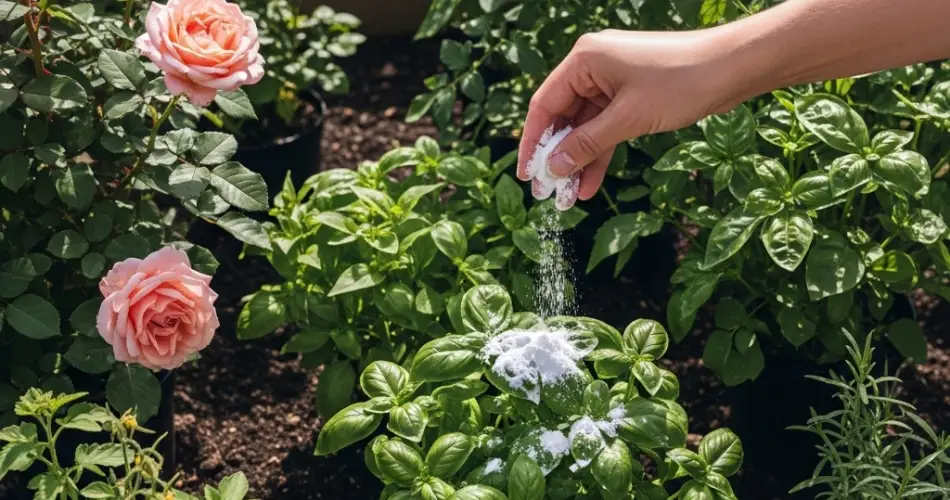Baking soda, or sodium bicarbonate, is more than just a kitchen staple—it’s also a powerful, natural ally for gardeners. Whether you’re dealing with powdery mildew, fungal infections, or pest issues, this humble white powder can be a game-changer in your garden. Safe, affordable, and environmentally friendly, baking soda offers effective solutions for several common plant problems without the need for harsh chemicals. Here’s how you can harness the power of baking soda to maintain a healthy, thriving garden.
1. Fighting Fungal Diseases
One of baking soda’s most well-known applications in the garden is its ability to combat fungal diseases like powdery mildew, black spot, and leaf blight. These fungal infections can spread quickly, damaging leaves, stems, and even fruits.
Powdery Mildew Spray:
-
Mix 1 tablespoon of baking soda with 1 liter of water.
-
Add a few drops of liquid soap (like castile soap) to help the solution stick to the leaves.
-
Spray the solution on affected plants weekly, preferably in the morning or late afternoon to avoid sunburn.
This solution works by changing the pH on the leaf surface, creating an environment that inhibits fungal growth. Regular use can prevent new infections and control existing outbreaks.
2. Controlling Pests Naturally
Although baking soda isn’t an insecticide, it can be combined with other ingredients to deter pests such as aphids, spider mites, and ants.
Pest Repellent Mix:
-
Combine 1 tablespoon of baking soda with 1 tablespoon of vegetable oil and a few drops of dish soap in 1 liter of water.
-
Spray this solution on plant leaves, especially the undersides where pests tend to hide.
The oil helps suffocate soft-bodied insects, while the baking soda discourages fungal conditions that often accompany pest infestations. Use this spray every 7–10 days or after heavy rains.
3. Soil pH Adjustment
Soil pH plays a crucial role in plant health. Baking soda can act as a gentle pH adjuster in overly acidic soils. While it’s not a long-term solution like lime, it can provide temporary relief.
Quick Soil Alkalizer:
-
Lightly sprinkle baking soda over the soil surface.
-
Water thoroughly to distribute it into the soil.
This method can help plants like lavender or rosemary that prefer slightly alkaline conditions. However, avoid overuse, as too much baking soda can disrupt soil biology.
4. Cleaning and Freshening Garden Tools
Baking soda isn’t just for plants—it’s also excellent for garden tool maintenance. Tools can harbor bacteria, fungal spores, and residues from diseased plants.
Tool Cleaning Paste:
-
Make a paste using baking soda and a small amount of water.
-
Scrub garden tools using a brush, then rinse and dry thoroughly.
This will help disinfect your tools, extend their life, and reduce the risk of spreading plant diseases.
5. Freshening Compost Bins
If your compost bin starts to smell sour or attracts too many flies, baking soda can help neutralize odors without harming the decomposition process.
Odor Control Tip:
-
Sprinkle a small amount of baking soda into the compost bin weekly.
-
Be careful not to overdo it, as too much can slow down the microbial activity.
Used in moderation, baking soda helps maintain a healthy compost balance.
6. Testing Soil Acidity at Home
If you’re unsure about your soil’s pH, you can perform a simple DIY test using baking soda.
Soil pH Test:
-
Place a few spoonfuls of moist soil into a container.
-
Add 1 tablespoon of baking soda.
-
If it fizzes, your soil is likely acidic.
This test doesn’t give you a precise reading, but it can help you understand the general condition of your soil so you can plan accordingly.
7. Deodorizing Plant Containers and Pots
Old plant containers can develop musty smells or mold. Baking soda helps clean and deodorize them effectively.
Pot Cleaning Solution:
-
Mix baking soda with water to make a scrubbing paste.
-
Apply it to the container surface, scrub, rinse, and allow to dry.
This prevents contamination when reusing pots for new plantings.
Final Tips for Safe Use
-
Avoid over-application: Too much baking soda can accumulate in the soil, affecting nutrient availability.
-
Test sprays on a small area of your plant first to ensure there are no adverse reactions.
-
Always apply solutions during cooler parts of the day, and avoid applying in full sun to prevent leaf burn.
Baking soda is a versatile, non-toxic solution for many common garden problems. By using it wisely and consistently, you can maintain healthier plants, improve soil conditions, and reduce your reliance on synthetic garden chemicals.



